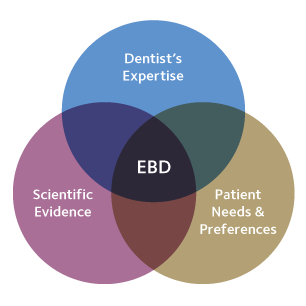Improving Your Health with Evidence-Based Dentistry
Posted on June 4, 2021 in Dental Health

Evidence-based medicine is a concept introduced in the 19th century that supports using the most current and best evidence to make decisions for patient care. When applied to the field of dentistry, it is referred to as evidence-based dentistry (EBD). According to the American Dental Association (ADA) this concept “integrates the dentist’s clinical expertise, the patient’s needs and preferences, and the most current, clinically relevant evidence. All three are part of the decision-making process for patient care.”
Dentists are presented with lots of data each month including new scientific studies, adaptations in standard procedures, pharmaceutical applications and changing technology. The Center for Evidence-Based Dentistry works to develop resources that allow dentists to review and apply the latest scientific evidence for patients as well as simplifying the new scientific evidence for patients to easily understand. When dentists are able to utilize this new information, combined with their own experience and the patient’s needs and preferences, the overall experience of visiting the dentist can be much more productive for everyone involved.
Here’s an example of EBD in action. A new patient to a dental office reports that they are an insulin dependent diabetic. The patient also reports excessive thirst and dry mouth and presents with new cavities. If the dentist has not had a lot of experience with diabetic patients, the dentist would likely review the latest evidence and professional organization recommendations for management of these patients. Through this process, the dentist can deliver care that is focused on the diabetic patient and hopefully result in better outcomes.
At Delta Dental of Iowa, we’re utilizing EBD to bring awareness to key preventive measures. For example, EBD recommends that children considered at an elevated risk (if they had a cavity filled within the last three years) should have sealants placed on their first molars. Based on this information, we’ve added messaging in our member and dentist communications to make both members and providers aware when a child is recommended to have this preventive treatment.
According to Dr. Jeffrey Chaffin, chief dental officer at Delta Dental of Iowa, the practice of EBD creates a stronger patient relationship while improving patient outcomes. “It’s important for patients to trust their dental provider and establish a dental home, meaning the patient routinely visits their dentist twice a year and treats their oral health care as an important element of their overall health. EBD engages the patient and the dentist to have the latest data involved when making decisions about patient care and treatment plans.”
It’s important for patients to do their part in creating this relationship with their dentist. Here are few ways to get the most out of your dental visits:
- Schedule and keep your twice a year visits to the same dentist. This will ensure problems are spotted early and the office will have your complete medical history.
- Be prepared to discuss any potential mouth, teeth, gum, tongue or throat issues as well as other chronic health issues at your next dentist appointment. This should include diagnoses like diabetes, heart disease, immune disorders, cancer, gastrointestinal issues or other chronic disease.
- While there is a wealth of information available to you on the internet or from family and friends, your dentist has invested their life in researching and staying current on scientific data. It’s okay to research, but trust that your dentist will have the most recent and applicable data.
- Brush twice a day and floss every day – and not just the day before your dentist appointment!
Make the most out of your dental visits by tracking your dental health and preparing your questions. With evidence-based dentistry, the patient and the dentist connect with the latest scientific data to make decisions for dental care that are patient-centered and scientifically supported.